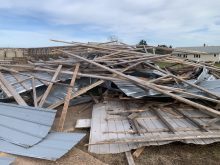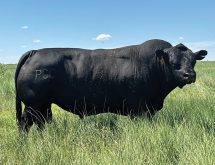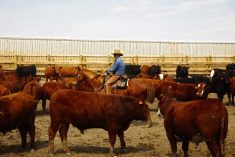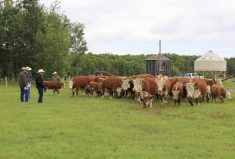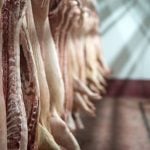Kevin Blair has never forgotten what his grandfather told him many years ago: “When everyone else is on the highway, take the grid.” It’s a message he’s made most of his life decisions by, and in the course of it, Blair Ag has learned how to tackle many of the issues that are moving to the top of the agenda for more and more farm families.
The Blair family — owners and operators of Blairs.Ag Cattle Company at Lanigan, Sask. — started with a mixed farm established by Kevin’s grandfather, Sandy, and turned it into a family of agricultural companies that includes retail crop inputs, animal nutrition, professional agronomy services, truck logistics and an animal genetics division that exports live cattle, embryos and semen to numerous countries around the world.
Read Also
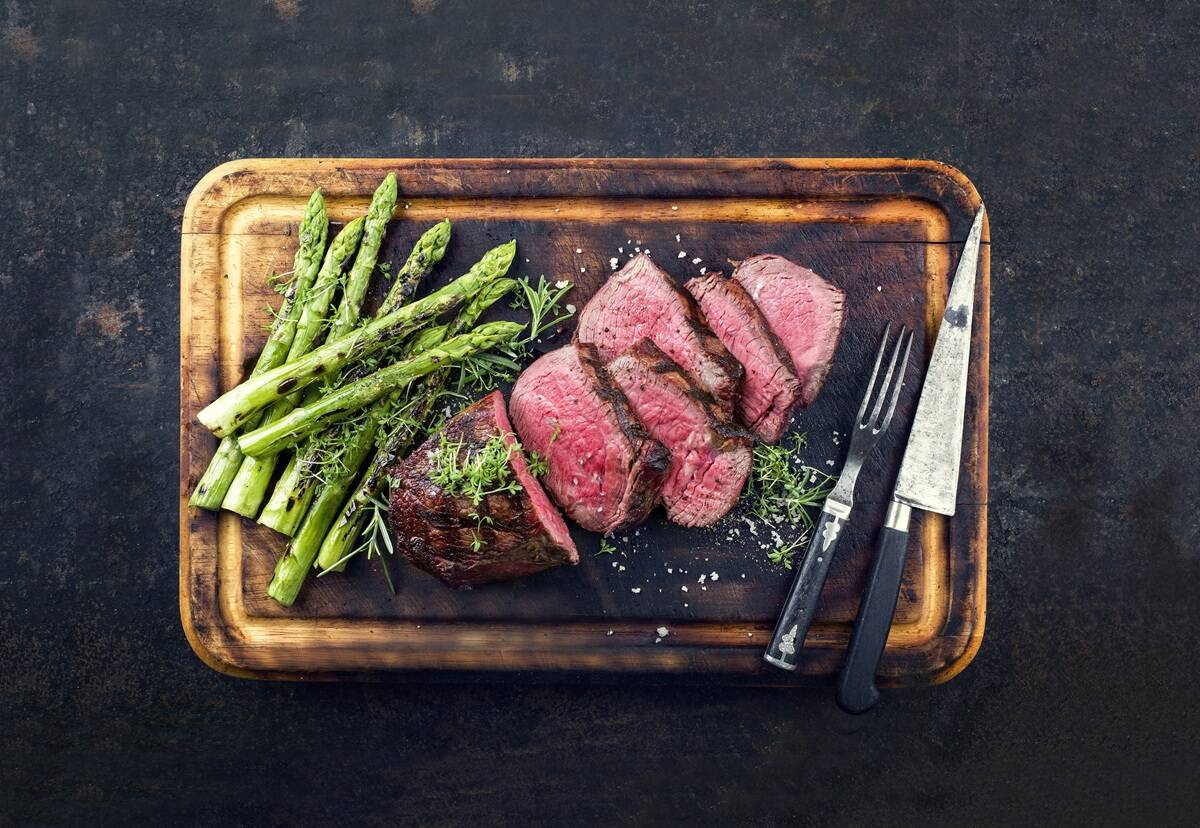
Building demand together: The impact of Canada’s beef import levy
The beef import levy has become a central tool for ensuring balance in Canada’s beef industry
It was Sandy and his brother Lyndsay who started the crop input business, bringing in the first rail car of Elephant brand fertilizer to Saskatchewan in the late ’40s. When Kevin’s dad Ron, and his brother Dale took over the business, they expanded the crop input side of things from being seasonal to a year-round business.
In 1988, Kevin entered the business, and in 2000 his cousin Darren joined, and together they have grown the retail side to eight outlets across Saskatchewan.
In 2003, Kevin and Darren took over ownership of the business and assumed the chief executive officer and chief operating officer roles respectively. “I’m a very strong believer in letting people at a very young age make decisions of consequence, and our grandfather Sandy had very similar beliefs. I think it’s that kind of thinking that makes us who we are,” says Kevin.
Spotting opportunities
The Blairs have always been good at spotting opportunities in agriculture. The farm got out of the purebred Simmental business in the ’80s but in 2006, with a lot of ageing cattle producers retiring and dispersing their herds, they saw an opportunity to get back into the purebred market in a way that many other producers hadn’t considered.
“One of the things that I recognized very quickly was that there was a huge global desire for Canadian genetics, but times had been tough in the beef industry over the past decade and a lot of prominent Angus breeders had exited,” explains Kevin. “Someone would need to fill the gap, so we decided we wanted this to be us.”
Not afraid to take risks
Although Blairs.Ag has grown into a large, diversified group of companies, its focus remains on what it knows best — which is agriculture — and building relationships with people.
“Whenever we look at adding different pillars to our business model, we always try to think about whether it will help us manage risk,” says Kevin. “We have the same philosophy when it comes to our customers. Our clients understand why we’ve stayed in the business, and understand our beliefs. We can build strong relationships with those people, and help them mitigate their risk, which makes them more profitable and by default makes us more profitable.”
Knowing how to manage risk is crucial in any business, but the Blairs aren’t afraid to take a measured leap, and they credit their predecessors for giving them that opportunity. “We are lucky in that we can take risks when others maybe don’t because our grandfather and fathers left the equity in the business,” says Kevin.
“They didn’t have an exit strategy, but rather a continuance plan, so they left the equity in the business because they thought that was the best way to support growth for the following generations. We have taken what they taught us and what they left for us, and expanded and built on it, and our wish is to continue that vision and strategy into the fourth and fifth, and hopefully the sixth generations.”
Grandpa Sandy, ever wise, told Kevin something else he has never forgotten about risk, which is that you only have to make seven out of 10 decisions right.
“The challenge is how you deal with that on a day-to-day basis,” says Kevin. “It’s okay to be wrong, but you want to make sure that you control your misses. Once you make a few decisions that work in your favour, it builds confidence, which helps you to manage risk even better and still be successful.”
The same philosophy extends to the company’s employees. Enabling them to grow and succeed, take responsibility and feel invested in the company starts with allowing them to make a few mistakes too.
“We don’t expect our employees to make every decision right, and we’ll support them. But another thing Grandpa said is it’s only a mistake if you make it twice,” says Kevin. “The first time is just part of the cost of education. Everybody is entitled to make mistakes, employees, family, everybody but we really try to not make the same one twice.”
What doesn’t kill you…
Learning from your own mistakes is one thing, but learning from tough times and traumatic events beyond your control (which, after all, seem an inescapable part of agriculture) is just as important.
Even though Blairs.Ag is widely diversified, bad things are going to happen. And although no business model is immune from mistakes, some models are going to help you transform those mistakes into innovations or changes that end up benefitting the business and the industry.
Kevin cites two good examples: the droughts in the late ’80s that encouraged the moisture-conserving spread of minimum tillage in Western Canada, and the BSE crisis that got packers and chefs figuring out how to add value to less desirable cuts of meat such as brisket and flank steaks.
“When you encounter challenges as a person or as a business, you become stronger and better because of it, no matter how difficult it is at the time,” says Kevin.
“In business, if you don’t find ways to learn and adapt, you just become fearful. As people age in business, their tolerance for fear and risk becomes less, and they wake up one morning and ask why they’re risking everything they’ve built for so long. That’s when they get frustrated with consumers, with suppliers and exit the business.”
Living the ABCs of agriculture
Kevin sums up the Blair family philosophy and business model as the ABCs of agriculture — Aspire to make a difference, Be a better me and Create an environment for others to succeed.
“C” is probably the most crucial, he says, because in order for the business to grow it has to include people outside of the family. And in order to be productive and successful, everybody has to feel they also have the same opportunity to grow and succeed.
The Blairs’ family of companies employs around 110 people, and while it’s a lot of people to manage, they are treated as part of the extended Blair family.
“You have to care about other people more than you care about yourself,” Kevin says. “You have to live that, and have high expectations for people and not hold them back. Sometimes you have to do things that aren’t traditional. Sometimes you have to lend money to employees that are in a jam. Sometimes you have to give them things that they never expected anybody would ever give them. You have to go that extra mile. If we can find employees that buy into our beliefs, and buy into agriculture, we’ll go a long way to support them personally.”
Don’t scare off the youth
Not “scaring off the youth” is something Kevin is passionate about, even when it’s not always easy to understand the next generation.
Millennials (those born between 1980 and 2000) are probably the most challenging generation there has ever been. Often described as the “entitled” generation, Millennials are tech-dependent, and having grown up with social media and the Internet, they require instant gratification.
They have high expectations but don’t always understand the steps needed to achieve them.
“Youth is so critical to help your business expand into the future,” says Kevin. “We try to identify young people that have a stronger work ethic, and desire to succeed. You have to get them to believe that they’re different than the rest of the Millennials and that’s a good thing.
“I say to them, ‘if you want to work less, and get paid more, and have plenty of time to go to the gym and walk the dog that’s fine, but agriculture is not the place for you.’”
“Agriculture is a place that has longer hours, takes more brain power for longer periods of time… there’s more inherent risk, but there’s nothing more gratifying than agriculture.”
The key is being able to identify talented people with the skills, ability and attitude that fit the company philosophy, says Kevin, who looks for what he calls “gravel road” employees, people who have travelled a road that isn’t necessarily traditional.
They may or may not have a university or college education, but they do have commitment to agriculture and a will to work hard and succeed, and many of Blairs.Ag’s most successful employees have only a high school education and tons of work experience.
“I encourage all youth to go to college, but we don’t hire based on education. What I care about is what’s in their brain and their soul. Everybody knows that kid in Grade 11, who’s kind of a smart ass and causes problems, and the teacher says, it’s such a shame because that kid has so much potential. I want that kid,” says Kevin. “If we take that person and put him or her in a role with lots of responsibility, they remember that for a very long time, because they don’t necessarily expect it.”
Grandpa’s legacy seems to be in safe, competent hands with the third and fourth generation of Blairs, who are working hard to make sure the next generations have the same support and opportunities that they’ve had.
“I hope that at least some of the next generation have a desire to continue on the business model,” says Kevin. “It may not be exactly the same as the one we have now, maybe their wishes and hopes and dreams will be slightly different but that’s okay, they’ll have the equity base to be able to do what they’re passionate about. And hopefully that will be in agriculture.”



